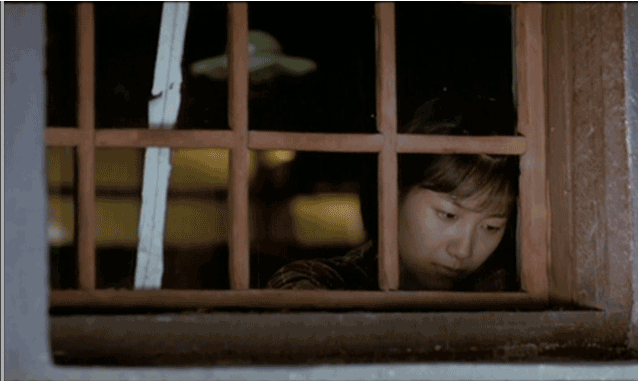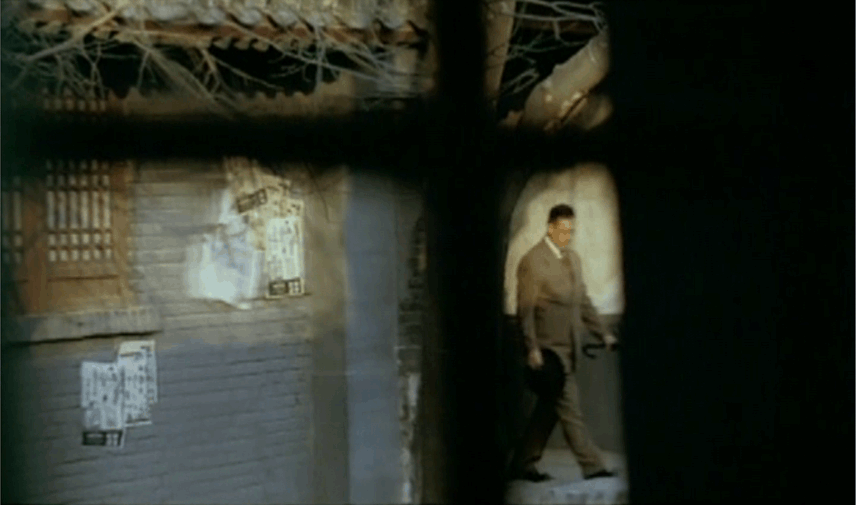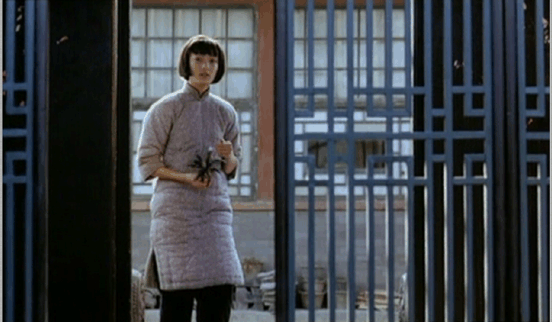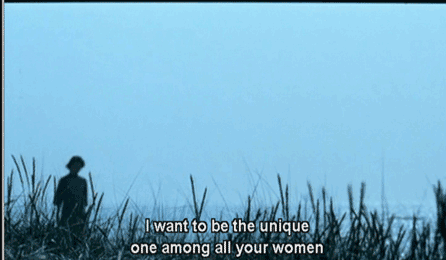
labrys, études
féministes/ estudos feministas
janvier/juin 2008-janeiro/junho 2008
Affective Memory, Female Subjectivity, and Cinematic Technique in Hu Mei’s Army Nurse (Nu er lo) (1985) and Letter from an Unknown Woman (Yi ge mo shen nu ren de lai xin) (2004)
E. Ann Kaplan, Stony Brook University
Abstract
In recent years, the reduction of government funding for films made in Mainland China has had contradictory results: On the one hand, directors are now freer to make a diversity of films and independent film making has developed enormously; but on the other, these same filmmakers are now prey to market forces as they seek funding for their projects. In addition, not all films made with independent funding can be shown in Mainland China (viz the case of Ye Lou’s Summer Palace). The ironies of this situation are complex and interesting: In order to explore them, this paper juxtaposes a 1984 film by female director Hu Mei made under the old system of government funding and strict censorship with a 2004 film by Xu Jinglei made in the new context of a China more open to international collaborations. One similarity between the eras when the films were made is that in 1984 China was undergoing cultural and political change and is in 2008 once again in a period of rapid transition albeit of a very different order. Arguably, this sense of a culture in the process of change, especially of women caught up in history, their fates impacted on by political situations, can be found in both Hu Mei’s Army Nurse (1984) and Jinglei Xu’s Letter from an Unknown Woman (2004).
key- words: film , china,women
I wanted to return to Hu Mei’s film (which I first saw when visiting Mainland China in 1987) partly as a tribute to her pioneering work on female subjectivity in an era when it was still difficult for sexual difference, let alone sexual intimacy, to be frankly treated in mainland Chinese cinema. But I was also interested in comparing cinematic strategies for articulating subjectivity through both directors’ use of flashback narration in the form of affective memory (that is memory burdened by intense feeling). T
he films share a structure of looking back to a past of frustrated female desire within a specific historical moment, but the degree of female autonomy each heroine is able to sustain differs markedly. If the gesture of history marking female subjectivity in each film figures loss or constraint, in Xu’s film the heroine’s control of the discourse and her life suggests a degree of hope that we might expect of the new millennial China despite the paradoxical heroine’s death that the narrative requires.
What Maureen Turim says of the Ophuls version of Letter from an Unknown Woman, “Death is the price that ironically allows the secret of a female’s desire to be told” (Turim, 1989;156) applies in a slightly different way to Xu’s remake. For death as such is less emphasized in Xu’s version, and while the heroine Miss Jiang does not speak until she has died, she has articulated that this refusal is her deliberate choice. She ultimately finds a way to express her desire to her lover, to make a connection after death, to reach into him by means of the letter. This letter, an extended remembering of her one-sided relationship to the writer whom she loved since a child, provides the structure for the entire film. Importantly, Miss Jiang also situates herself as a subject in history.
By comparison, Hu Mei’s film seems melancholy. The voice-over of Hu’s heroine, Xiaoyu, is not linked to a letter, and is fragmented, as I note below. She receives one letter from her lover, and sends one back, but is unable to make a connection with him, let alone enjoy any real physical intimacy. While Miss Jiang situates herself as a subject in history as if she belonged there, history seems to oppress and confuse Xiaoyu. Xu’s film arguably completes a process Hu Mei began in regard to female subjectivity, to women taking part in history,[1] and resistance to prevailing patriarchal codes.
But while Letter apparently carries on what Hu Mei started, in setting her film back in the 1930s and 40s, Xu suggests that Chinese women may still have further to go in establishing their gender difference and autonomy. In other words, the China of the 1930’s and 40’s offers a model for articulating female subjectivity through remembered sexual desire. Does the film, then, comment on a sexual desire and sexual difference that had not matured or was not possible in the time of Hu Mei’s film but is still not fully available to young Chinese today?[2]
However that may be, there is a striking change in representation of female subjectivity and its related affect from 1985 to 2004—a change partly related to changing State control. Until recently, China wanted to de-emphasize the personal and self-interest so as to promote subjects loyal to and identifying with the State. Thus, Fourth generation films, as I argued in 1989 (Kaplan, 1989/1990), offered narratives that educated audiences in what were appropriate and inappropriate emotional sets and subjectivities. While New Wave Cinema in the West tried to disrupt Hollywood’s focus on the individual (a focus that served capitalism), Fifth generation mainland filmmakers aimed to disrupt representing subjectivities loyal to the State (a focus that served Communism).
Women filmmakers in the 1980s especially found ways to develop female subjectivity through flashback narration suggesting intimate emotions, and thus to open up new ways of being.[3] Hu’s film was made as Fifth Generation directors were challenging the traditions of Fourth Generation filmmakers: The Chinese Film System was opening up to new themes and subjectivities generated by young directors often sent to work on film in remote regions.
Hu sets her film back in the 1970’s so as to remember how controlled that generation was. Xu’s film meanwhile is made in the contemporary situation of a dramatically changed China, inevitably opened up to global trends in media, internet and popular culture.[4] The subjectivities Xu is interested in, in Letter, are inspired by Western literature and film, but I will argue for an important difference related to the specific Mainland interest in foregrounding a female desire hitherto blocked.
While in my earlier article and discussion of Hu Mei’s film I focused on difficulties of cross-cultural exchange, and on the challenges Fifth generation directors faced, here I aim to distinguish different kinds of subjectivity and affective memory generated by the genres and cultural contexts of the two films. This is not to say that dangers about cross-cultural exchange no longer apply,[5] and while I am still wary of writing about films from a culture I don’t know enough about, so much interchange has happened since 1987 that hopefully scholars from different nations have a better understanding of one another’s cultural perspectives and theoretical models. I am interested here in emotions and history as methods of articulating or foregrounding female subjectivity, and the fact that Xu turned to a Western model of frustrated female desire is significant in suggesting cross-cultural emotional resonance in regard to impossible love represented in the form of affective memories
The move I make in this paper to think about affect versus emotion in cinema offers a new avenue for thinking about film technique in relation to both subjectivity and meaning. Study of emotions as part of the cinematic apparatus has not been central in western film analysis partly because of the somewhat limited options about affect offered by psychoanalysis (long dominant in western film theory), but also because interest in how viewers negotiate meanings in films, alternatively decoding and encoding what is given, was another main approach.[6]
If psychoanalytic feminist film scholars following Laura Mulvey’s pioneering lead originally theorized a voyeuristic “male” gaze—a sort of one-sided look, focused on a psychoanalytic understanding of how the gaze was structured within the diegesis and in regard to castration—theorists of film narration concentrated on how plots unfold, and on cinematic techniques for story-telling.[7] Looking at affect may bring the approaches closer together.

Cinema’s affect depends on the kind of cinema involved, whether commercial, State supervised, independent or avant-garde. Commercial or State controlled dominant cinema tends either to utilize affects already present in a culture, and produce more of such affects, or use cinema to instill certain feelings and related subjectivities in audiences. That is, public emotional sets partly structure filmic emotions and are partly structured by cinema depending on the film system in any particular nation. In the West, Independent cinema often challenges dominant public feelings, offering alternative affective sets to the normative ones in play.
Such films may draw their alternate affective sets from personal experience which does not mean that the perspective is limited. Rather, such films become case studies for seeing differently. Ann Cvetkovich has argued that films carry an archive of feelings, especially public feelings; they embody historical constructions that may continue as legacies today and are important as opening repressed memories. Both films offer a window through the heroines’ flashback onto repressed traumatic historical mainland Chinese memories—those of the Japanese invasion and the Cultural Revolution.
Hu’s and Xu’s films,then, offer a glimpse into a process of increasing female subjectivity in China through the cinematic technique of the flashback spoken by the heroine illustrating affective memory. As Maureen Turim notes, there are psychoanalytic implications to the flashback strategy: The spectator is partly positioned as the “analyst,” opening up “identification with the narrator of the flashback” (Turim, 1989: 18).
We identify with both heroines, but more closely with Miss Jiang because of the way Xu deploys the flashback narration. Xiaoyu has far less control of her discourse than does Miss Jiang because her flashback narration is fragmented, broken. However, in other ways, Xu’s representing of female subjectivity is more normative than is Hu’s Mei’s: Hu achieves a less normative subject position paradoxically because of her heroine’s fragmented discourse: This enables Hu to use history to deconstruct how sexual difference was organized at the time.
A useful way of elaborating this different conception of female subjectivity and related feelings is through looking at differing filmic techniques in regard to representing feelings on screen. Brian Massumi’s distinction between affect and emotion helps foreground in what ways Hu’s technique of the flashback enables a less normative female subject, yet paradoxically one who has less agency that does Xu’s heroine. In his
“The Autonomy of Affect” (1995) Massumi (influenced somewhat by Deleuze) distinguishes two parallel systems of feeling in images—a level of what he calls emotional “intensity” and one of “quality.” Via psychological case studies, Massumi argues that the signifying order is disconnected from “intensity.” For Massumi, “intensity” is a kind of feeling (to be distinguished from “quality” which is linked to cognition): Intensity is “disconnected from meaningful sequencing, from narration….
”He notes that “Language, though head-strong, is not simply in opposition to intensity. It would seem to function differentially in relation to it.” (1995:219)
And he concludes the discussion by saying:
“Approaches to the image in its relation to language are incomplete if they operate only on the semantic or semiotic level…what they lose precisely is the expression event—in favor of structure.” (1995:220)
This expression event is what the spectator feels, then, but which does not get interpreted, put into language, or paid attention in film analyses. Let me be clear: Both affect and emotion require language (neither Deleuze nor Massumi pretend otherwise), but affect connotes feeling as trace, resonance, uncertainty, while emotion indicates fixing of a specific feeling.
In a longer version of this paper (forthcoming) I show how both films offer examples of intensity (expressive events) and quality (feeling linked to cognition), but that in Hu’s film intensity is paramount whereas emotion dominates Xu’s film: I will focus on the different effects each technique has, and its different somewhat contradictory, complex implications for female subjectivity and agency.
Hu Mei’s film is difficult to categorize as a genre within western frames: It straddles a realism quite close to Italian Neo-Realism with a few surprising avant-garde effects. Xu’s film fits the psychological melodrama genre of Ophuls’ original, with a difference of being somewhat less sentimental. Hu also had to bear in mind what the Chinese Film Bureau of the era would permit in regard to theme and style—something Hu mentioned specifically in my 1987 talk with her, as I note below. Army Nurse opens with an enigmatic slow panning shot of key characters in the film, accompanied by a voice-over reading of a poem significantly about a bird flying away, being looked for again and not returning Hu here sets up the theme of presence, absence and loss.
One assumes the last shot of a woman is the heroine who picks up the narration in the abrupt cut to the Cultural Revolution, and young people destroying bourgeois households. Xiaoyu is caught up in these historical events without understanding. “ Everything suddenly changed,” she says in the flashback voice over. History seizes hold of the heroine: History violently uproots her, confusing her; history is turmoil, violence, noise, and Xiaoyu seems not to understand or insert herself into what’s happening. But the film carries a kind of personal archive of intimate feelings as Hu constructs her heroine’s subjectivity newly for the time through her strong but frustrated desire for the wounded soldier, Ding Zhe:
This desire is expressed through Xiaoyu’s desiring gaze, and finally in a mutual desiring gaze and silent intimacy as Xiaoyu bandages Zhe’s wound . Because her chararcters can’t speak their desire (it is forbidden and they are under constant surveillance), Hu has to use other techniques, such as close-up of eyes looking into eyes, and as a result the entire film might be said to function in the modality of Massumi’s “expression event,” of intensity rather than “quality” (emotion linked to language and cognition).
Fragmentation of the discourse was a deliberate aim. In my 1987 interview with Hu, she noted that women were “characterized by a fragmentation and disorientation—a shorter attention span than men—all of which she attributed to conflicting demands” (Kaplan, 1989:151). Women, Hu said, had a less linear way of thinking than men, women are split, disoriented by the many demands on them. She had wanted to convey this sense of her heroine’s fragmented, dispersed thinking in a voice-over that would have included unfinished sentences, meaningless phrases, disjointed series of sentences. But the studio leadership refused to allow a soundtrack that did not accord with realist conventions. Elements of this aim remain, however, and result in a striking contrast between the official male discourse and that of Xiaoyu in the film.
Sessions with the Party Officer overseeing the nurses and the hospital make clear both how the female subjects are constantly under surveillance, subject to the patriarchal and official Party gaze, abjected , and the constraints under which they labour. In an interview with the Official it is clear that wind of Xiaoyu’s interest in Ding Zhe has reached him. He warns Xiaoyu to put her work and study first: “Devote yourself to your duty, “ he says. If she can’t get her personal life in order, she must write more thought pieces and join the Party. Yet Xiaoyu finds ways to assert her subjectivity as her love for the soldier deepens and intensifies. It becomes her reason for being, and yet, once he leaves, she has no recourse for finding him. An appropriate husband is finally found for her after she moves to a city and the Cultural Revolution is over, but she is unable to carry the marriage through because of her unfulfilled love. She returns to work in the mountain hospital where the two met.
Some of Hu’s original aim to show a different feminine discourse remains in Army Nurse despite the Film Bureau’s forbidding Hu carrying disjuncture much further. Something remains of an attempt to reveal a feminine difference. Xu’s film by contrast offers a coherent story of a life-long obsession on the part of a oman who, despite her fixation on the writer, is able to retain control of her life. She knows what she wants despite its pain. She chooses. She is seen owning the gaze, staring out windows and through doors to catch a glimpse of her lover.


It is she who sets up the meetings with the writer by being where he is (the one exception is when the writer pulls her out of the march protesting Japan’s invasion but even then she is the one who brings about the sexual liaison).
Far more than Lisa in Ophuls’ version, Miss Jiang offers an example of a female subjectivity that controls the discourse. Just because of this, Xu’s film evidences for the most part emotion (quality, cognition) rather than affect or intensity. For example, in the scene soon after she has to leave Shandong because of the Japanese invasion—she says she lost her family and friends in the war—she articulates her situation clearly: That is, the visual track is “fixed’ by the language that states her feelings and her conscious decisions. She is also the one to actually initiate the first sexual contact once in the writer’s home
Contrast this with Xiaoyu’s hesitancy,
inability to speak or to make decisions, inability to challenge
the authorities who control her. Miss Jiang situates herself as a subject
in history: History does not confuse her even as it deprives her of loved
ones. She moves with history rather than as for Xiaoyu being moved by
it. Xu shows Miss Jiang in the City, with crowds around her, and in one
scene shows a cinema advertising 1930’s American female melodramas, like
Woman of the Year (Image).
Conclusion:
Significantly, Hu’s heroine does not control her discourse throughout the film: Like Letter, Army Nurse is constructed as a flashback narration, but Xiaoyu’s voice over moves in and out, and is not consistent. Hu’s comments, as we saw suggest that this was deliberate, and in this sense allows for a view of female subjectivity close to French feminist and postmodern concepts of female subjectivity as not tied to the teleological in the manner of male discourse.
There are two arguments to make, then, in regard to contrasting Hu and Xu’s films: One could see Xu’s film as making a stronger case for women in having her heroine’s voice-over dominate throughout, and in presenting a woman who, while fixed on an impossible love for a man outside her reach, at least owns this love, is connected through the child, and who is subject of the gaze (she all but stalks the writer):
She regrets nothing, and even offers an implicit critique of the male as unable to feel deeply. And she situates herself in history through joining protests and being aware of political dangers the reporter ignores. On the other hand, one could argue that Hu’s idea of subjectivity is closer to recent theories to do with splitting, fragmentation and dispersal across a range of identities as how subjectivity in fact functions. Yet her heroine lacks agency, partly because of the controlling power of the State, something not yet in place in 1930s China. Xiaoyu’s place in history is as subjected, while for Xu’s heroine there is clearly much more freedom and possibility to act, to be a subject in history. As in my earlier paper, I will leave it up to my audience to decide which argument makes most sense, and hope we can follow up these ideas in discussion.
NOTES
[1] See paper for this conference by E. K. Tan on “Desire, Repetition, Subjectivity: Unknown Woman as Signifier in Xu Jinglei’s Meta-Adaptation of .Letter from an Unknown Woman,” for more on issues of history and also re the Ophuls and Zweig versions.
[2] The fact that films like Ye Lou’s Summer Palace, full of explicit sexual intercourse and bi-sexual and homosexual relationships are not able to be shown in China yet suggests indeed that there are still official prohibitions on sexuality regardless of what is tolerated in practice. For premiering the film at the Cannes Film Festival without permission from the Chinese government, Ye Lou was forbidden from making movies for five years. While the government denied that content had anything to do with it, the film does show much explicit sex and also contains footage of the 1989 Tiananmen Square demonstration.
[3] Whether such subjectivities jeopardize State control is not something I am equipped to answer and that I leave to scholars more knowledgeable about mainland China today
[4] For details regarding changes in film production and themes in the millennium, see
Paul Pickowicz (2006) and August Palmer et al. (2007). There is no time here to show the
dramatic changes in how films may now be produced in China as against the 1980s.
[5] In 1989, I argued that something positive may emerge from such cross-cultural work in that exchanges that result can be helpful in initiating a meaningful dialogue. It’s not a matter of being right or wrong but of differing interpretations depending on national, political, gendered and other contexts.
[6] Critics focus on emotional relationships and what characters are shown to feel, but have not usually looked at how affect structures screen space, or at what Massumi (see below) calls the “expressive event” in contrast to emotions specific to particular characters.
[7] While scholars have recently shown an interest in cinema and the body, the focus is visceral spectator response (Shaviro, Williams) or the haptic [touch and smell (Marks)]. In none of these cases do scholars discuss the spectator’s emotions implicitly involved in visual, cognition and bodily response: Visual pleasure obviously implies sexual arousal in the spectator (never explicitly addressed until Linda Williams’ work on pornography); touch may involve joy or shame, disgust or hate.
References
Cvetkovich, Ann. An Archive of Feelings: Trauma, Sexuality and Lesbian Public Cultures. Durham, NC: Duke University Press, 2003.
Berry, Christopher J. China on Screen. Cinema and Nation. New York: Columbia University Press, 2006.
E. K. Tan on “Desire, Repetition, Subjectivity: Unknown Woman as Signifier in Xu J Jinglei’s Meta-Adaptation of .Letter from an Unknown Woman.” Paper read at Nanjing Conference on “Gender in Chinese Cinema.”
Kaplan, E. Ann. “Problematizing Cross-Cultural Analysis: The Case of Women in Recent
Chinese Cinema.” Reprinted in Chris Berry, ed. Chinese Cinema. London: The British Film Institute, 1990
Massumi, Brian, “The Automony of Affect.” Critical Inquiry (Autumn, 1995).
Palmer, August, et al. The Urban Generation: Chinese Cinema and Society at the Turn Of the 21st Century. Durham, NC. Duke University Press, 2007.
Pickowicz, Paul. From Underground to Independent: Alternative Film Culture in Contemporary China. Lanham, MD.: Rowman and Littlefield, 2006.
Turim, Maureen. Flashbacks in Film: Memory and History. New York and London: Routledge, 1989.

labrys, études
féministes/ estudos feministas
janvier/juin 2008-janeiro/junho 2008